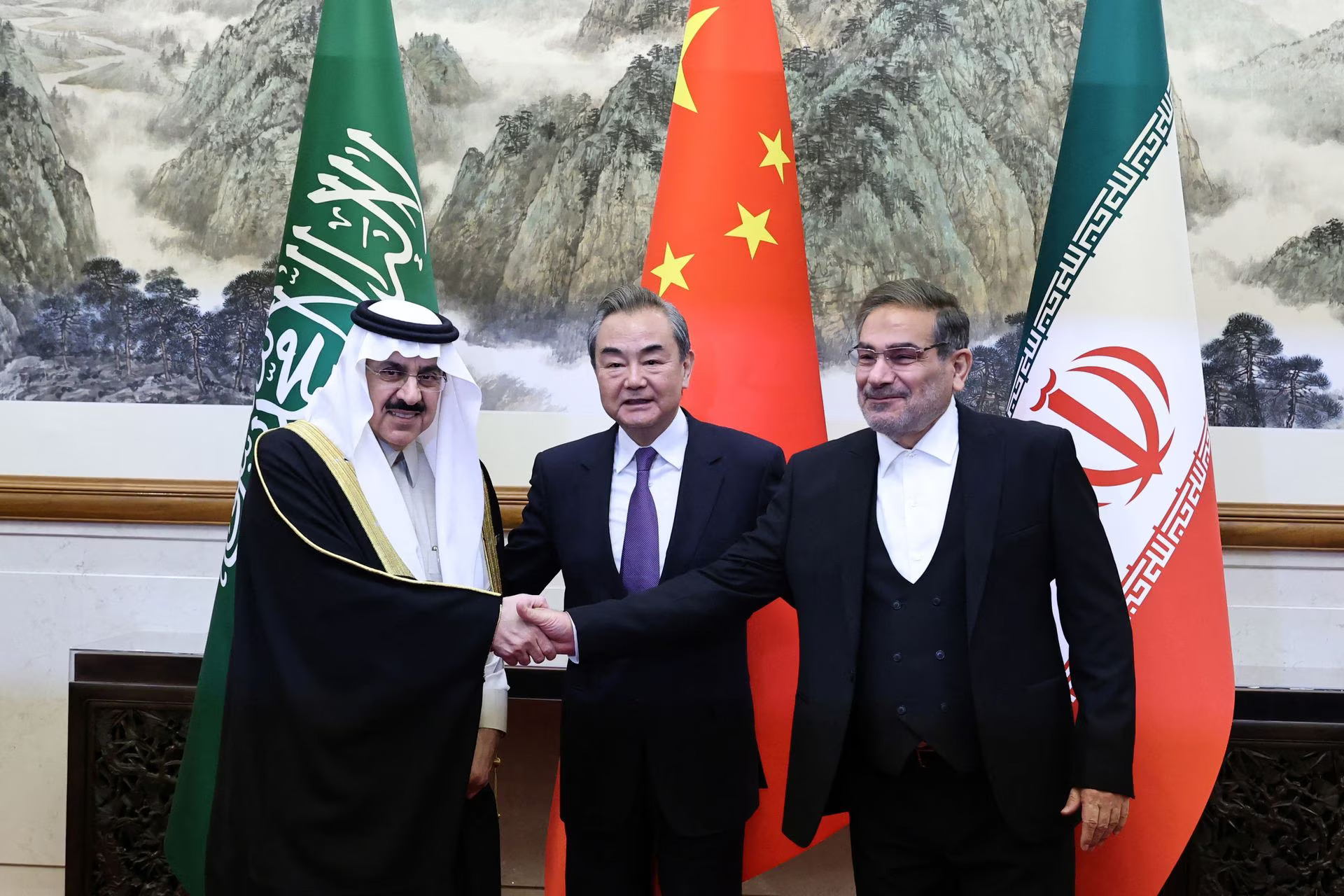Middle East regional rivals Saudi Arabia and Iran signed a China-brokered deal to restore diplomatic ties, seven years after relations were severed.
A joint statement was signed on March 10 between Ali Shamkhani, Secretary of Iran’s Supreme National Security Council (SNSC), Saudi National Security Adviser Musaid Al Aiban, and, China's senior diplomat Wang Yi, according to Iran's state broadcaster IRIB.
As per the joint statement reached by the three countries, Iran and Saudi Arabia have agreed to resume diplomatic relations within two months and reopen embassies and agencies in both countries, Iran’s news agency IRNA reported.
It added that both Riyadh and Tehran stressed "respect for sovereignty and non-interference in each other's internal affairs", in accordance with a previous security cooperation agreement signed in April 2001.
The statement concluded that "the three countries declare their decisive will to use all efforts to strengthen regional and international peace and security."
Diplomatic relations between the two countries were severed in 2016 after protesters stormed Saudi Arabian diplomatic missions in Iran in retaliation to the execution of Sheikh Nimr al-Nimr, a religious leader, in Saudi Arabia.
Iran supports the Lebanese Hezbollah group and Yemen's Houthi rebels, against whom Saudi Arabia has led a military campaign since March 2015.
Saudi Arabia had blamed Iran for a 2019 missile and drone assault on its oil plants, a charge Tehran denies. The two countries have also been locked in rivalry for decades, backing allies fighting proxy wars across the region.
Shamkhani said that the move followed Iranian President Ebrahim Raisi's visit to China in February, and his talks with Chinese President Xi Jinping. The discussions provided a platform for "new and very serious negotiations" between Iranian and Saudi delegations.
Referring to the agreement, Iranian Foreign Ministry Spokesman Nasser Kanani said during a press conference on March 13 that the two countries would reopen their embassies in Tehran and Riyadh "within a timeframe of not more than two months", along with consulates in the Iranian city of Mashhad and the Saudi port city of Jeddah.
Meanwhile, Saudi Foreign Minister Faisal bin Farhan told the Saudi daily Asharq al-Awsat that the China-brokered agreement does not mean all disagreements have been resolved, adding that the agreement indicated the mutual will of Saudi Arabia and Iran "to resolve differences through dialogue".
Iran's Foreign Minister Hossein Amir-Abdollahian said in a tweet on March 10 that the resumption of bilateral relations would "provide great capacities to the two countries, the region and the Islamic world".
"The neighbourhood policy, as the key axis of the thirteenth government's foreign policy, is strongly moving in the right direction, and the diplomatic apparatus is actively behind the preparation of more regional steps," the minister added.







 Russian peacekeeping forces, deployed in the Karabakh (Garabagh) region of Azerbaijan since 2020, have commenced their withdrawal from the area.
Russian peacekeeping forces, deployed in the Karabakh (Garabagh) region of Azerbaijan since 2020, have commenced their withdrawal from the area.
 The number of evacuees from flooded areas in Kazakhstan has reached 97,852 people, including about 32,856 children since March 27.
The number of evacuees from flooded areas in Kazakhstan has reached 97,852 people, including about 32,856 children since March 27.
 The Islamic holy month of fasting, Ramadan comes to an end this week with the celebration of a joyous festival called Eid (meaning “festival” in Ar...
The Islamic holy month of fasting, Ramadan comes to an end this week with the celebration of a joyous festival called Eid (meaning “festival” in Ar...
 Azerbaijan officially unveiled the logo for the upcoming 29th session of the Conference of the Parties to the United Nations Framework Convention o...
Azerbaijan officially unveiled the logo for the upcoming 29th session of the Conference of the Parties to the United Nations Framework Convention o...



